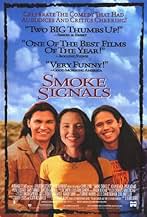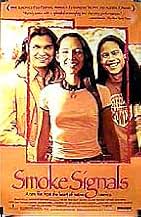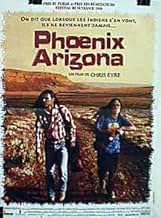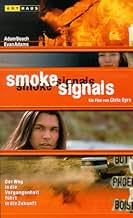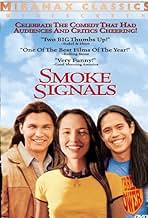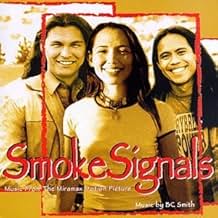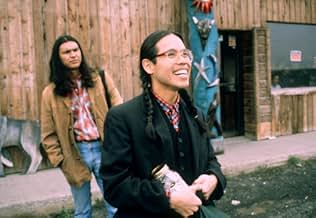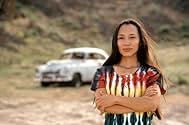Le 4 juillet 1988, le jour de la fête d'indépendance des Blancs, après une nuit de beuverie, Arnold Joseph monte dans sa camionnette jaune et disparaît à jamais, laissant derrière lui sa fem... Tout lireLe 4 juillet 1988, le jour de la fête d'indépendance des Blancs, après une nuit de beuverie, Arnold Joseph monte dans sa camionnette jaune et disparaît à jamais, laissant derrière lui sa femme Arlene et son fils Victor.Le 4 juillet 1988, le jour de la fête d'indépendance des Blancs, après une nuit de beuverie, Arnold Joseph monte dans sa camionnette jaune et disparaît à jamais, laissant derrière lui sa femme Arlene et son fils Victor.
- Prix
- 15 victoires et 8 nominations au total
- Lester Fallsapart
- (as Leonard George)
Avis en vedette
The premiere was at an old, Egyptian-themed cinema in Seattle and the house was half full for the 4:30 matinee. The audience was predominately Native American.
On exit, Sherman stood on the sidewalk in the late afternoon Seattle light and waited nervously like a child, to see the reaction to the film (which had ended with unanimous applauds from the half house audience). A film crew was there for exit polling.
A diminutive Native American female elder slowly approached Sherman. She moved forward and extended her arms around him into a hug and spoke softly, "Thank you."
Sherman was mush.
Don't miss this film. He's not 'the Spike Lee of Native American film making' as the Time Magazine of that week put it. He's an independent, regional film maker, whose background is the 'Rez.'
I thought it was going to be a plot less road movie, but it turned out instead to be about family and had a very specific story and plot line that avoided clichés. In that way it reminded me of the New Zealand "Once Were Warriors" - with about 1% of that violence about aborigine families struggling to have dignity within the confines of a white-restricted world. Like that movie you virtually don't see whites at all.
I very much liked how the flash backs were handled (in the context of "the past is never dead, it's never even past" type evocation). The title is used for several layers of meanings about smoke and fire.
Dar Williams's road song was used in an ironic road way, but I think it was added on afterwards. The passenger is bopping along to the song on the radio saying over and over that it's her favorite song, which would be odd for an obscure song. But the joke is also that the car can only go in reverse.
John Trudell (he's the DJ at KREZ) and Elaine Miles ("Marilyn" from "Northern Exposure") have teeny parts. The music is appealing --though none by Trudell and very little traditional. The closing credits have a Walala (the trio with Rita Coolidge and sister) tune that I thought it would be cool if it got nominated for an Oscar, if it's not previously recorded, as I thought it would be something different at the Academy Awards. The other music mostly also comes ostensibly from KREZ and is by Native Americans but in the singer-songwriter mode (no Bill Miller used). Other than Ulali (I thought was Walela, but I was corrected) and Dar when I tried to read the credits as they quickly went by I didn't recognize any of the names.
I almost immediately caught "Powwow Highway" on cable and was surprised to see how much it must have influenced "Smoke Signals" as a Native American road movie.
(originally written 7/2/1998)
Le saviez-vous
- AnecdotesThe first movie to be written, directed, and co-produced by Native Americans.
- GaffesThere is no way that one bus driver could have driven the same bus continuously from Idaho to Arizona. Federal law would prohibit it.
- Citations
Thomas Builds-the-Fire: How do we forgive our fathers? Maybe in a dream. Do we forgive our fathers for leaving us too often, or forever, when we were little? Maybe for scaring us with unexpected rage, or making us nervous because there never seemed to be any rage there at all? Do we forgive our fathers for marrying, or not marrying, our mothers? Or divorcing, or not divorcing, our mothers? And shall we forgive them for their excesses of warmth or coldness? Shall we forgive them for pushing, or leaning? For shutting doors or speaking through walls? For never speaking, or never being silent? Do we forgive our fathers in our age, or in theirs? Or in their deaths, saying it to them or not saying it. If we forgive our fathers, what is left?
- Générique farfeluAny similarity to actual persons, living, dead, or indigenous, is purely coincidental.
Meilleurs choix
- How long is Smoke Signals?Propulsé par Alexa
Détails
Box-office
- Budget
- 2 000 000 $ US (estimation)
- Brut – États-Unis et Canada
- 6 745 362 $ US
- Fin de semaine d'ouverture – États-Unis et Canada
- 43 574 $ US
- 28 juin 1998
- Brut – à l'échelle mondiale
- 6 745 362 $ US
- Durée
- 1h 29m(89 min)
- Couleur
- Mixage
- Rapport de forme
- 1.85 : 1


